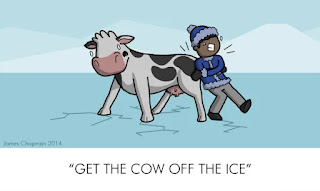Along with interesting words, I decided to compile some phrases from other languages. Some of them are kind of comical, and others are just plain cool.
Eierlegende Wollmilchsau
Literally meaning "egg-laying wool-milk-sow" in German, it describes a thing that has many purposes or functions.
Tomaten auf den Augen haben
In German, it means "You have tomatoes on your eyes". It means that you're not seeing what others are; in other words, that you're oblivious to what's going on around you.
Klappe zu, Affe tot
A German phrase which translates as "close the lid, the monkey is dead". Essentially, it means "let's put an end to this" or "end of story".
A German phrase which translates as "close the lid, the monkey is dead". Essentially, it means "let's put an end to this" or "end of story".
Die Kuh vom Eis holen
Another German phrase that means "get the cow off the ice". It refers to escaping a risky situation.
Det är ingen ko på isen
In Swedish, it means, "There’s no cow on the ice". Pairs nicely with the previous phrase, don't you think? It means that there's no need to worry.
La douleur exquise
From French, and translates to "the exquisite pain". It describes the pain of loving someone that you can never have.
Esprit de l'escalier
A French phrase which means "staircase wit", it describes the annoying phenomenon of coming up with something clever to say... after the conversation has ended.

Cavoli riscaldati
An Italian phrase that means "reheated cabbage", and refers to the pointless attempt to revive a relationship with a former love. It comes from the proverb "cavoli riscaldati né amore ritornato non fu mai buono", which means "neither reheated cabbage nor revived love is ever any good".
An Italian phrase that means "reheated cabbage", and refers to the pointless attempt to revive a relationship with a former love. It comes from the proverb "cavoli riscaldati né amore ritornato non fu mai buono", which means "neither reheated cabbage nor revived love is ever any good".
Olisihan vintillä leipää, mutta lapset söi rappuset
A Finnish phrase meaning "There is bread in the attic, but children ate the stairs". It means that you could have achieved something, but you waited too long or foolish mistakes ruined it.
Katosi kuin pieru Saharaan
Another one from Finnish, it translates to "disappeared like a fart in the Sahara". It means that something is gone for good.
Dod yn ôl at fy nghoed
A Welsh phrase that means "to return to one's trees". It refers to returning to a balanced state of mind.
Rhoi'r ffidil yn y tô
In Welsh, it means "putting the fiddle in the roof". If you've done that, you've given up.
A fo ben, bid bont
A Welsh proverb meaning "to be a leader, be a bridge". It means that a leader should help others to achieve their goals.
Mae e'n cadw draenog yn ei boced
Translates from Welsh to "He keeps a hedgehog in his pocket". It means someone is thrifty with their money.
Deuparth gwaith yw ei ddechrau
Translation: "Starting the work is two thirds of it." I should take that advice instead of procrastinating all the time.
A Welsh phrase that means "to return to one's trees". It refers to returning to a balanced state of mind.
Rhoi'r ffidil yn y tô
In Welsh, it means "putting the fiddle in the roof". If you've done that, you've given up.
A fo ben, bid bont
A Welsh proverb meaning "to be a leader, be a bridge". It means that a leader should help others to achieve their goals.
Mae e'n cadw draenog yn ei boced
Translates from Welsh to "He keeps a hedgehog in his pocket". It means someone is thrifty with their money.
Deuparth gwaith yw ei ddechrau
Translation: "Starting the work is two thirds of it." I should take that advice instead of procrastinating all the time.






No comments:
Post a Comment